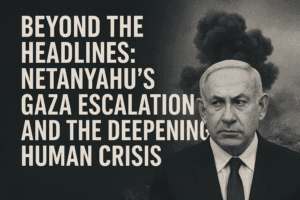Beyond the Headlines: Netanyahu’s Gaza Escalation and the Deepening Human Crisis
Israeli Prime Minister Netanyahu has confirmed a significantly expanded military offensive in Gaza, targeting not only Gaza City but also densely populated central camps and the Muwasi coastal area sheltering over half a million displaced Palestinians. He frames this escalation as the fastest path to defeat Hamas and end the war, contingent on Hamas disarming and releasing hostages – a demand Hamas dismissed as lies.
This expansion occurs amidst a catastrophic humanitarian crisis: the UN explicitly declared “starvation” has replaced a looming famine, with the grim milestone of 100 Palestinian children now confirmed dead from malnutrition. Simultaneously, at least 31 Palestinians were killed while desperately seeking aid on Sunday, with witnesses reporting Israeli fire. Adding to the crisis, Al Jazeera correspondent Anas al-Sharif and four colleagues were killed in an airstrike near Shifa Hospital, which Israel controversially linked to Hamas.
Netanyahu faces mounting pressure, including calls for strikes by hostage families domestically and international condemnation at an emergency UN Security Council meeting, where the US defended Israel but others decried the human cost. Despite Netanyahu denying a policy of starvation and pledging increased aid access, the widening offensive into areas teeming with displaced, starving civilians signals a deepening catastrophe with no clear resolution. The lethal disconnect between stated objectives and on-ground reality grows ever wider.

Beyond the Headlines: Netanyahu’s Gaza Escalation and the Deepening Human Crisis
The news of Israel’s expanded military offensive in Gaza isn’t just another headline – it represents a dangerous escalation in a 22-month conflict with devastating human consequences. Here’s a deeper look beyond the official statements:
- The Escalation: Wider Than Advertised
- Prime Minister Netanyahu confirmed the offensive targets not only Gaza City, as initially announced, but also densely populated “central camps” and the coastal Muwasi area – regions sheltering over half a million displaced Palestinians. This expansion signals a significant intensification, likely driven by pressure within Netanyahu’s coalition demanding tougher action.
- Netanyahu framed this as the “best way to end the war speedily,” arguing Israel “has no choice but to finish the job and complete the defeat of Hamas.” He claimed the war could “end tomorrow” if Hamas disarms and releases all hostages. Hamas dismissed his statements as “blatant lies.”
- The Staggering Human Cost (Beyond the Battlefield)
- Starvation Crisis Deepens: The UN delivered a stark warning at the Security Council: “This is no longer a looming hunger crisis; this is starvation… Humanitarian conditions are beyond horrific.” Two more Palestinian children died of malnutrition-related causes on Saturday, bringing the grim total to 100 children dead from starvation since the war began. At least 117 adults have also perished from malnutrition since June.
- Aid Seekers Killed: At least 31 Palestinians were killed Sunday while desperately seeking food aid. Witnesses and hospitals reported Israeli forces opening fire on crowds near Israeli-controlled corridors (Morag, Netzarim) and distribution points in central and southern Gaza. Survivors described it as a “death trap,” but felt they had no choice to feed their families. Israel denied incidents at specific aid sites mentioned.
- Journalist Deaths: Heavy bombardment in Gaza City late Sunday killed Al Jazeera correspondent Anas al-Sharif and four colleagues outside Shifa Hospital. Israel claimed al-Sharif “posed as a journalist” and was with Hamas, a claim he had previously denied and which the Committee to Protect Journalists had warned was part of an Israeli “smear campaign.”
- Mounting Pressure: Domestic and International
- Hostage Families & Protests: Relatives of Israeli hostages held in Gaza called for a nationwide strike next week, demanding the government reverse the Gaza City offensive plan and prioritize hostage release. Demonstrations near the Gaza border called for an end to the war and the hostages’ return.
- Global Condemnation: The UN Security Council held an emergency meeting. While the US defended Israel’s right to security and rejected genocide allegations, other members expressed deep alarm. China condemned “collective punishment,” Russia warned against “reckless intensification,” and UN officials pleaded for action on starvation.
- Allied Friction: Germany halted exports of military equipment potentially usable in Gaza. While Chancellor Merz emphasized continued friendship, Netanyahu accused him of “buckling under” international criticism.
- Netanyahu’s Vision & Contradictions
- Netanyahu outlined post-war goals: Hamas defeated, Gaza demilitarized, Israeli “overriding security control,” and a non-Israeli civilian administration. He insisted, “Our goal is not to occupy Gaza, our goal is to free Gaza.”
- He flatly denied a policy of starvation (“There is no hunger… There was certainly no policy of starvation”), blaming aid shortages solely on Hamas – a claim starkly contradicted by UN agencies and the mounting death toll from malnutrition.
- Despite restrictions, he claimed to direct the military to “bring in more foreign journalists” – a significant shift if implemented.
- The Unfolding Catastrophe
- The expansion into areas packed with displaced civilians, already living in “beyond horrific” conditions and dying of hunger, risks unprecedented civilian casualties and further collapse of the humanitarian response.
- The killing of journalists reporting on the crisis severely undermines the flow of independent information.
- Netanyahu’s assertion that this offensive will end the war swiftly is met with deep skepticism internationally and by hostage families, who see it jeopardizing negotiations and prolonging the agony.
This escalation isn’t occurring in a vacuum. It’s happening amidst a documented famine, the systematic killing of aid seekers, the silencing of journalists, and profound domestic and international dissent. While framed by Netanyahu as a necessary step to victory, the immediate and foreseeable consequence is a dramatic worsening of an already catastrophic humanitarian disaster for Gaza’s civilians, with no clear path to the political resolution or security he promises. The gap between the stated objectives and the grim reality on the ground has never been wider or more lethal.
You must be logged in to post a comment.